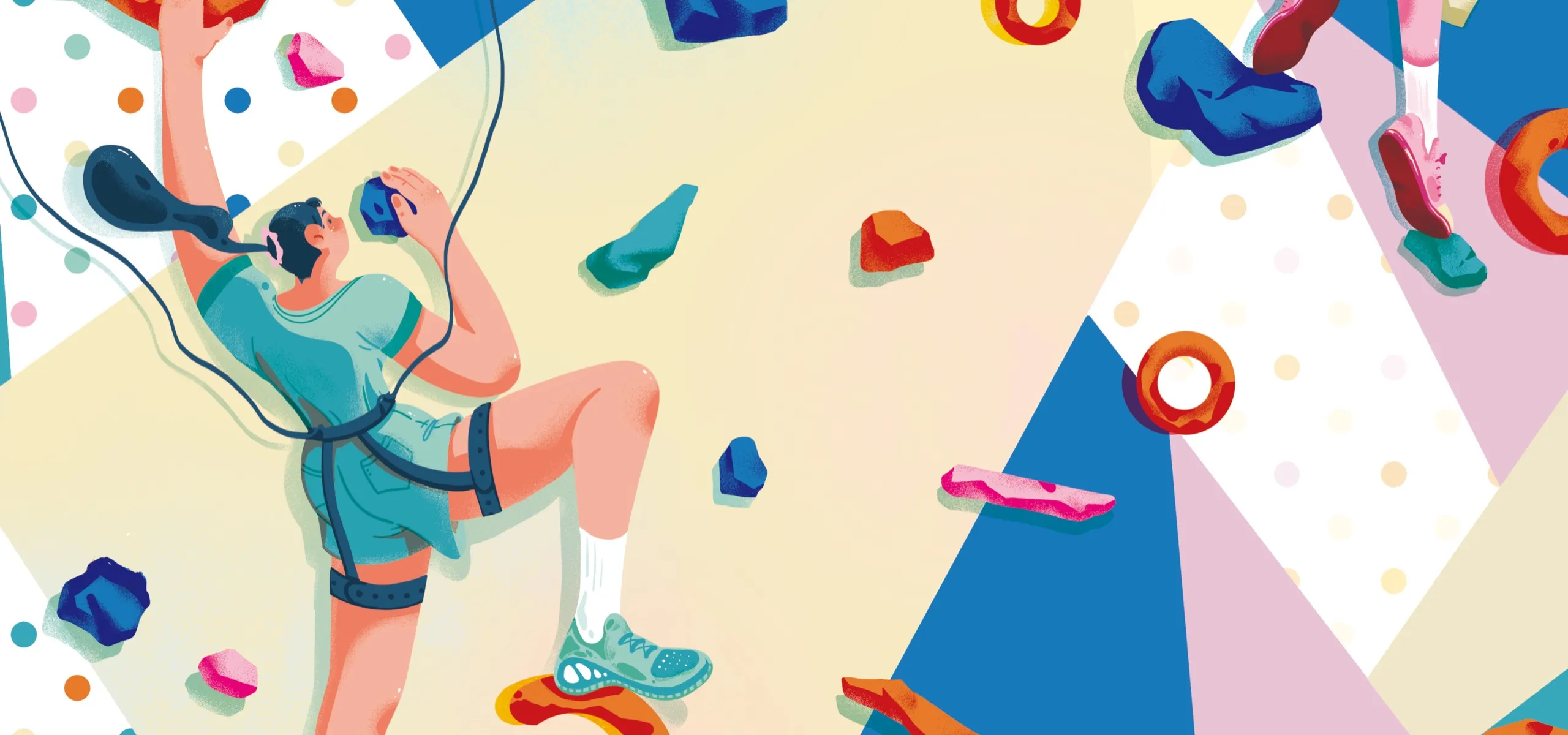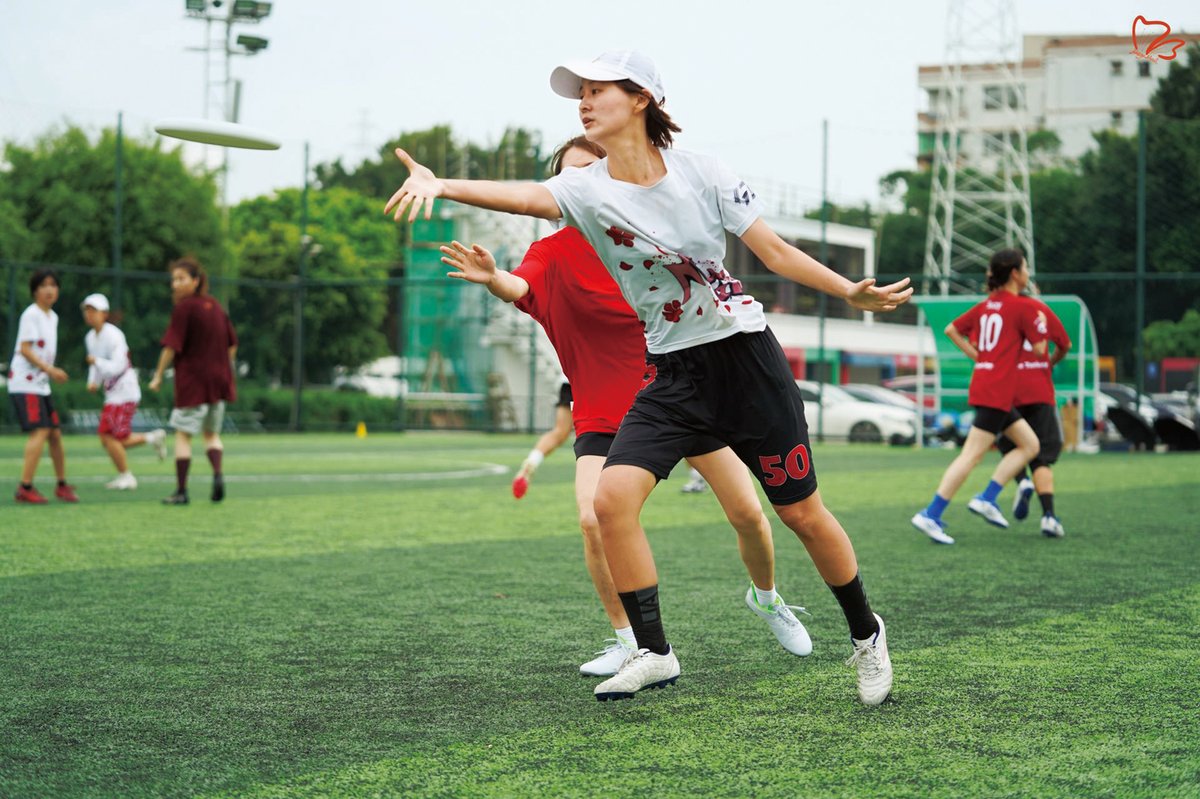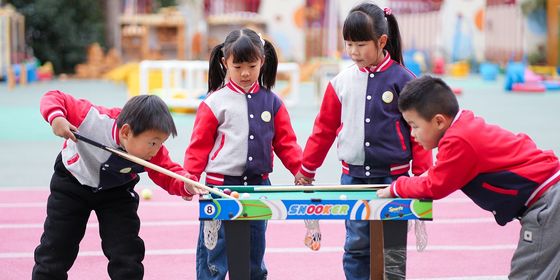Frisbee, rock-climbing, and other trendy pastimes are seeing growing interest from women, who make their own community in these sports
Muscles ripping with effort, Chen Yu kicks off from the ground. Her body sways alarmingly, but then her foot finds its hold five feet off the ground and she’s off: making her way up and across brightly pebbled walls without a harness, over and over, in a montage set to 1990s Mandopop before hopping off and examining the chalk on her manicure in mock despair. “The hands of the working people!” a friend quips, off-camera.
Chen, a 31-year-old strategic planner in Beijing, is also a sports blogger on lifestyle app Xiaohongshu, where she documents her exploits at dancing, working out, and most of all, rock-climbing. She started getting into the sport seriously a year ago after she watched the rock-climbing events in the Tokyo 2020 Olympics and felt inspired by Slovenian athlete Janja Garnbret, one of the world’s top female rock-climbers, who won one of the first Olympic gold medals in the sport.
Rock-climbing is one of many new sports that have become popular among young urban Chinese in the past year, as intermittent Covid lockdowns curtailed travel and many indoor entertainment options. According to a survey of 1,216 respondents born between the 1980s and 2000s conducted by 36Kr, a China-based publishing and data company, it is among the year’s top five trendy sports activities, alongside Frisbee, skateboarding, cycling, and home workouts (often led by influencers or celebrities). Many of these trendy sports are also being pursued by women.
Contrary to the stereotype that street sports are pursued by males, 36Kr’s survey showed that 66.81 percent of women surveyed said they loved skateboarding, almost twice the ratio of men. On Xiaohongshu, which has an immense female user base, searches under the category of “skateboarding” doubled in the first half of 2022, while searches for “Frisbee” soared by 62 times. According to research firm iiMedia, females made up 62 percent of rock climbers in China in 2018.
Chen tells TWOC what she finds most attractive about rock climbing is that it requires all-round abilities: a good physique (flexibility and core stability in particular), climbing techniques, and analysis of climbing routes. This means that physical strength, which usually gives males an edge in many other sports, does not guarantee one’s success in rock climbing. Female climbers, who are typically lighter and more flexible, may even have an advantage on complex routes, where they have to stretch and angle their bodies to reach difficult holds.
Gender segregation in sports is the norm in most schools in China, with boys and girls usually playing separately on sports teams and boys more frequently engaged in competitive sports—basketball and soccer in particular—on the playground. Around 60 percent of young sports players in China are male, according to research firm iResearch.
Before she fell in love with Ultimate Frisbee this past July, Xing Suying, a 26-year-old IT worker in Beijing, had done sports such as swimming and CrossFit, but usually alone and with less enjoyment. “I’ve always wanted to participate in competitive sports such as soccer and basketball, but I couldn’t find girls to play it together, nor did I want to play with boys,” she says. She tells TWOC that she once signed up for a soccer club, but wasn’t accepted because there were not enough girls to form a women’s team.
Frisbee, however, is often played on mixed teams. One type of match, Mixed Ultimate, requires teams to play with a “4-3” ratio, with three positions played by women. Wu Xiaohua, now one of the leaders of a women’s Ultimate Frisbee team called Mega Mad in Guangzhou, tells TWOC she benefited from such rules when she started playing Frisbee in 2012 at the invitation of an American teacher at her high school in Shenzhen.
At that time, Ultimate Frisbee was still a niche sport in China and was played with a “5-2” or even a “6-1” ratio due to the rarity of female players. “As you could imagine, not many girls played sports ten years ago,” says Wu. “In a sport like basketball, even if a girl wanted to play, there was no way for her to join in when all the other players were boys and when the sport allows physical contact.”
Like Chen with rock-climbing, Wu believes her sport is friendlier to women with less physical strength or previous sports experience. Unlike soccer or basketball, Ultimate Frisbee is non-contact, which protects women from unwanted touching or aggressive playing in a mixed game.
Still, some women complain that males still dominate the mixed games. Li Rong (pseudonym), a 28-year-old white-collar worker in Shanghai, tells TWOC she will only play in all-women matches as male players seldom passed the disc to female players. Xing also believes that players of all genders might subconsciously pass to male teammates in a pick-up game, believing them to have better skills. Males also typically get to throw the “pull”—the first throw in the game—as their greater physical strength allows the frisbee to fly farther.
Due to longstanding male dominance in most sports, leading to the stereotypes that males have better sports ability and mastery of the rules, a number of female players also mention they’ve encountered patronizing attitudes from men in their sports. Xing recalls some male players telling her “even a kid can play better than you,” and believes such comments may discourage novice women from staying in the sport.
Also discouraging to some women is the public’s scrutiny since they’ve become more visible in sports. On social media, disparaging terms like feipan yuan (飞盘媛, “frisbee belles”) were coined to denigrate women who supposedly dress too fashionably or revealingly while playing, leading to accusations that they don’t take the sport seriously and are only there to attract (male) attention on social media. Relatedly, they are accused of taking over pitches previously used for soccer in order to stage photos.
Chen tells TWOC that she received messages shaming her as “prostitute” on Xiaohongshu, after she posted photos of her wearing a bikini when sun-tanning and swimming. She feels the attacks on feipan yuan are complete nonsense. “It’s up to me to wear what I like. Why should I explain the clothes I wear to others?” she says, adding that the accusation that feipan yuan are taking up pitches is also unreasonable. “They booked the space via legitimate channels and paid for it.”
Xu Jing (pseudonym), a 29-year-old skateboarding coach and organizer of an 800-member women’s surfskating community in Chengdu, believes that building an all-women sports community is one way to make sports more enjoyable for women and insulate them from attacks. She started her community in Chengdu in February when she saw more and more novices practicing with unsafe methods. She now offers one free offline session in which she teaches one step or trick in surfskating every Saturday, and organizes a WeChat group where women can share their skills with one another and get feedback.
She thinks that women can focus on themselves and have more enjoyment in the sport in a purer and more female-friendly environment. “Without feeling the need to ‘attract male attention,’ we just enjoy the sport itself,” says Xu, telling TWOC that women in her collective feel more comfortable sharing their feelings and encouraging each other.
She also feels that, in a female sports community, women feel more comfortable knowing that nobody would judge their appearance or clothing. “Even if a girl wears skimpy clothes in summer, she won’t be criticized by any of us. We would even praise her look and share our opinions on good-looking outfits together.”
Similarly, in Wu’s all-women Ultimate Frisbee team, Mega Mad, gender does not factor into the equation when players decide which teammates they pass to or who leads the “pull.” Wu has noticed more women are getting interested in joining. In May, when the team held an open house where new players got to experience the game, they had to increase their quota from 40 to 60 players due to surging interest, with many having just started playing frisbee for a month or two. “It was such a spectacular scene. We have so many girls running on the pitch,” says Wu.
According to Pandonut, an independent Chinese Ultimate content platform, there have been 12 women’s Ultimate Frisbee teams in China by May, 2022. Wu estimates that three-quarters of them were newly founded this year. She thinks that the popularity of Frisbee among women in the current sports trend has played a part in the growth of professional women’s Ultimate teams in China. “With more female players joining the sport, we have a larger base of members to select,” Wu tells TWOC.
Now a “veteran” rock-climber with more than a year’s experience under her belt, Chen has completed several intermediate routes and has developed attractive muscle lines on her back. She notices that girls make up the majority of her new followers on Xiaohongshu every week, and many have commented that they see her as a role model. She offers them encouragement to overcome their fear of rock-climbing—and sports in general.
“I think in rock climbing, gender difference is blurred. What’s amazing about this sport is that as long as you keep training and keep climbing, you can reach the summit one day,” she says.
Play Like a Girl: How Women Forge New Communities Through Sport is a story from our issue, “The Data Age.” To read the entire issue, become a subscriber and receive the full magazine.














